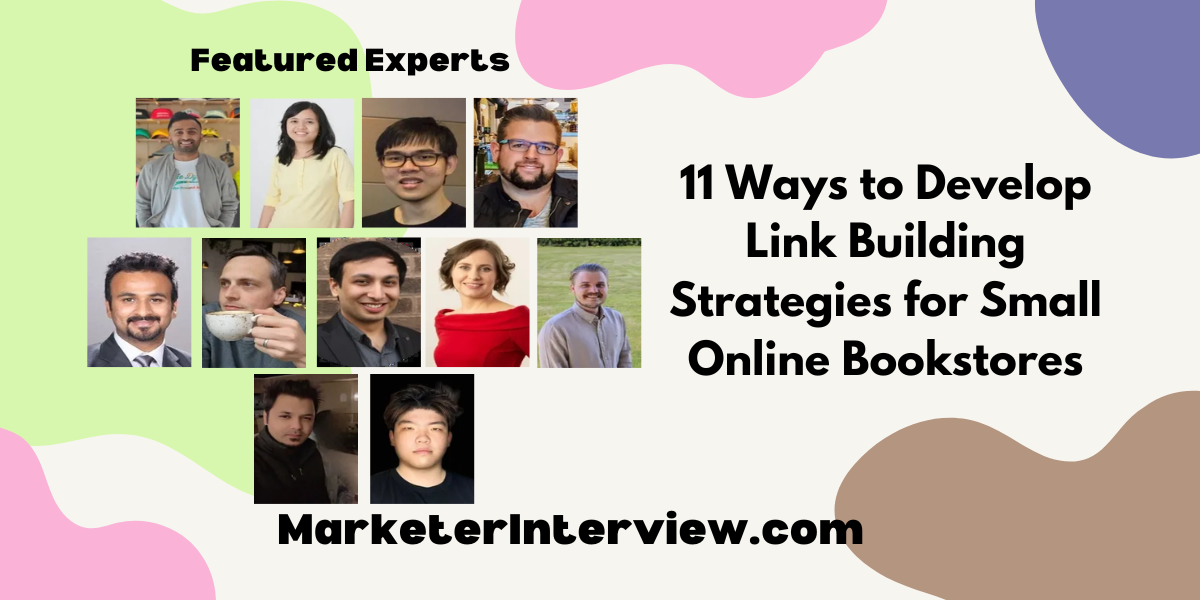11 Ways to Develop Link Building Strategies for Small Online Bookstores
In the digital age, small online bookstores must leverage innovative link building strategies to stand out. We’ve gathered insights from SEO experts and CEOs, sharing their unique tips from launching local reading initiatives to sharing valuable book-related content. Discover the top eleven techniques these professionals recommend for enhancing your bookstore’s online presence.
Want to get quoted in MarketerInterview.com content just like this? Apply to become a contributor today!
Contents
- 1 Launch Local Reading Initiatives
- 2 Collaborate with Local Authors
- 3 Create Content for Niche Audiences
- 4 Partner with Book Bloggers
- 5 Produce Unique Book Content
- 6 Craft Niche-Specific Book Lists
- 7 Have Exclusive Interviews with Authors
- 8 Engage in Community Partnerships
- 9 Collaborate with Micro-Influencers
- 10 Write Guest Posts for Niche Sites
- 11 Share Valuable Book-Related Content
Launch Local Reading Initiatives
Launch a local reading group or book club that can be shared on local event boards, social media, library websites, and directories.
By doing so, you not only generate local link-building opportunities but also engage with book enthusiasts who are always looking for new groups or new reads.

George Cotter, SEO Consultant, Tall Marketing
Collaborate with Local Authors
Word of mouth is the way to go. The problem with small online stores is that people have a hard time building trust; we can thank scammers for that.
How do you develop link-building strategies for small online bookstores? By collaborating with local authors and book clubs. You can also conduct interviews and ask them to link back to your website.

Rahul Vij, Co Founder, WebSpero Solutions
Create Content for Niche Audiences
At Digital Web Solutions, we’ve developed successful link-building strategies tailored for small online bookstores, leveraging their unique niche. One particularly effective technique is creating and sharing compelling content that celebrates lesser-known authors or genres. For example, we once collaborated with a bookstore to launch a monthly blog series featuring indie authors. This series enriched the bookstore’s content and attracted backlinks from the authors’ platforms and genre-specific forums interested in promoting underrepresented voices in the literary world.
The key here is to focus on community and shared interests. When you create content that resonates with a specific audience, like indie literature enthusiasts, you’re more likely to generate genuine engagement. These communities appreciate the recognition and are often eager to link back to sources that boost their visibility. This strategy enhances your SEO through valuable backlinks and builds your reputation as a supportive and authoritative figure in the niche market.

Vaibhav Kakkar, CEO, Digital Web Solutions
Partner with Book Bloggers
My recommendation is to focus on building and leveraging partnerships with book bloggers and niche websites that focus on a particular genre to which you can appeal with your collection.
In particular, you should prioritize reaching out to bloggers who specialize in book reviews, literary discussions, or book recommendations, and do the classic bit of offering them free review copies of your books in exchange for honest reviews and backlinks to your bookstore’s website.
Essentially, it’s the same strategy as for a brick-and-mortar store, but digital. For the niche angle, look for collaborations with niche websites or forums related to literature, reading clubs, or book enthusiasts, and see if you can contribute guest articles or sponsor events.

Kate Kandefer, CEO, SEOwind
Produce Unique Book Content
For small online bookstores, a great tip for developing link-building strategies is to create and share unique content that book lovers can’t find elsewhere. For example, you could produce insightful author interviews, behind-the-scenes content about the book industry, or detailed guides on genres.
Once you’ve created this content, reach out to book blogs, literary forums, and reading groups to share it. Not only does this provide valuable content for their audiences, but it also earns you quality backlinks as they link back to your original content.
This strategy helps establish your bookstore as a knowledgeable source in the book community, enhances your SEO, and drives more traffic to your website through the connections you build with these platforms.

Daniel Bunn, Managing Director, Innovate
Craft Niche-Specific Book Lists
Here’s a link-building tip for small bookstores: create niche-specific book lists (e.g., “Top Travel Memoirs”) and target book bloggers with relevant audiences.
Reach out with personalized messages highlighting the value your list offers their readers and the potential for collaboration (featuring your list with a link back to your bookstore in exchange for affiliate income). This leverages valuable content with targeted outreach to build relationships with book influencers who can drive traffic.
This personalized approach builds relationships with relevant websites and earns high-quality backlinks, driving traffic to your online bookstore.

Faizan Khan, Public Relations and Content Marketing Specialist, Ubuy UK
Have Exclusive Interviews with Authors
I worked at Amazon for four years as a software engineer on the Amazon Fulfillment Technology team.
One effective link-building strategy for small online bookstores is to collaborate with local authors for exclusive interviews or book reviews. This not only provides valuable content but also encourages authors to link back to your site, boosting your SEO and credibility.

Peter Wang, Founder, Exploding Insights
Engage in Community Partnerships
Developing link-building strategies for small online bookstores is to leverage local community partnerships and events. This approach not only helps in acquiring high-quality backlinks but also fosters community engagement and builds local brand awareness.
Technique: Leverage Local Community Partnerships and Events
Steps:
Identify Local Organizations and Influencers:
Reach out to local schools, libraries, book clubs, authors, bloggers, and community organizations that have an interest in books and literature. Building relationships with these entities can provide opportunities for collaboration.
Host or Sponsor Local Events:
Organize or sponsor literary events such as book readings, author signings, book fairs, and writing workshops. These events can be held in partnership with local organizations and venues. Ensure these events are promoted online with backlinks to your bookstore.
Create Collaborative Content:
Collaborate with local authors and influencers to create content such as interviews, guest blog posts, book reviews, and reading lists. These collaborators can share the content on their websites and social media platforms, providing backlinks to your bookstore.
Offer Educational Workshops:
Host educational workshops or webinars on topics related to literature, writing, and book publishing. Partner with local schools, libraries, and community centers. Promote these workshops through the partners’ websites, which can include backlinks to your store.
Participate in Local Online Directories and Blogs:
Get listed in local business directories and write guest posts for local blogs and news websites. These platforms often have high domain authority and provide valuable backlinks.
Engage with Local Media:
Pitch stories to local newspapers, magazines, and radio stations about your bookstore, upcoming events, or unique book collections. Media coverage typically includes backlinks to your website.
Create a Community Resource Page:
Develop a page on your website dedicated to local literary resources, including links to local authors, book clubs, and literary events. Encourage these entities to reciprocate by linking back to your resource page.
Utilize Social Media for Event Promotion:
Promote your events and collaborations on social media platforms. Encourage partners and attendees to share the events, which can lead to organic backlinks through social media shares and event pages.

Yash Gangwal, Founder, Urban Monkey
Collaborate with Micro-Influencers
Budget is a significant consideration for small online businesses. So, I recommend collaborating with micro-influencers. Even though their follower base is not as large as that of macro-influencers, they typically have higher engagement and a more significant impact on their community.
Offering collaborative projects can be a great strategy, whether it’s writing guest posts, creating review videos, or promoting discounts, etc. Especially if you’re collaborating to create book videos, such as reviews or summaries, you can build high-quality backlinks from video-based platforms like YouTube.
Send a personalized message or email to micro-influencers within the book niche and offer collaboration ideas. While collaborating with micro-influencers, consider other strategies like giving exclusive discounts and giveaways on your website for viewers. This can boost traffic and engagement in your online bookstore.

Marissa Sabrina, Creative Director, LeadLearnLeap
Write Guest Posts for Niche Sites
One effective tip for developing link-building strategies for small online bookstores is to write guest posts for well-regarded websites within your niche. This method allows you to demonstrate your expertise, deliver value to the audience, and include a link to your e-book either in your author bio or within the article itself.
To identify guest posting opportunities, you can utilize tools like Google, Ahrefs, or BuzzSumo. Use these tools to search for keywords related to the topic of your e-book and then filter results by criteria such as domain authority, website traffic, and social shares. Additionally, you can directly contact the editors or owners of these websites and propose your idea for a guest post.

Rizki Kadir, Automotive Writer and Software Engineer, Our Own Cars
In the context of small online bookstores, a key technique for building a strong link-building strategy is to create and share valuable, book-related content that appeals to a wider audience. One effective approach is to develop comprehensive book lists, reviews, and reading guides that can be used as resources by other websites, bloggers, and social media influencers in the literary space.
Start by identifying popular book genres or themes that resonate with your target audience. Create high-quality content such as “Top 10 Must-Read Mysteries of the Year” or “The Ultimate Guide to Classic Literature for Teens.” Ensure these pieces are well-researched, visually appealing, and offer unique insights that make them stand out. Once your content is ready, reach out to relevant websites, bloggers, and influencers who might find it useful for their readers.
Offer them the opportunity to feature your content on their platforms, with a backlink to your bookstore for the full article or additional resources. This not only drives traffic to your site but also establishes your bookstore as a credible source of literary content.

Adam Bogle, Senior Marketing-Coordinator, Richards-Wilcox Canada
Want to get quoted in MarketerInterview.com content just like this? Apply to become a contributor today!






